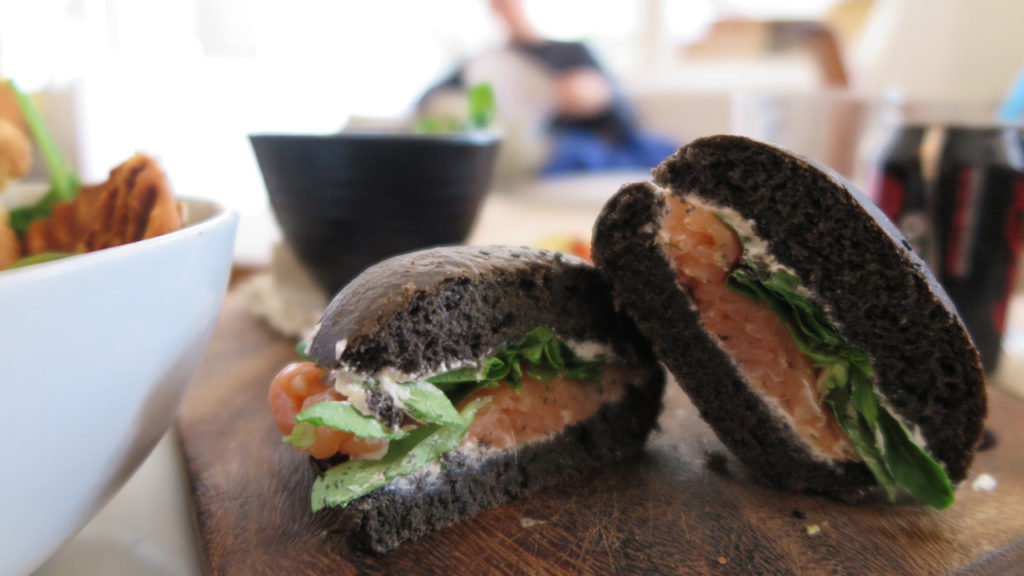While taking a Greek cooking class in a friend’s home, it dawned on me: Our western, American way of cooking isn’t the only way! I knew that of course — a fan of Chinese, Mediterranean, Indian and other ethnic foods, I know our way of cooking in America isn’t the only way — but how rarely I act on that knowledge! Mostly I think of ethnic food as what you eat when you go to a restaurant. My homemade meals typically included meat, carbs, butter and something sweet (the gooier the better!). Since that class I’ve nearly eliminated butter for olive oil, added more fresh produce, simplified the number of courses and begun to make peace with not feeling full all the time. Maybe this time my new leaf will stay turned over.
Reforming the way I eat is nothing new. I’ve been trying to lose weight for as long as I can remember. (OK, I can remember being 3 years old, and I’m pretty sure this wasn’t on my mind then. But ever since high school, I’ve felt an urgent need to drop a few “el bees.”) I’ve tried liquid diets, low fat, low carb, high protein, counting calories, Diet Center, Weigh Down, South Beach, Atkins, Pritikin and more. If it worked for Oprah, I’ve probably tried it.
It’s not that all those ways of eating don’t work — often they do. When calories eaten are less than calories expended, the number on the scale goes down. The problem isn’t the program or a lack of information. I know what to do to lose weight, get fit and be healthy. And I often do it, for a time. But the temptation to go with my gut, to eat what sounds yummy and tastes good, eventually prevails and I give in. Better to have what will satisfy me in this moment, I reason, than to deny myself. The fruit of denial — pounds dropped — takes so long to harvest, while the pleasure of eating what I want right now, is so, well, immediate. Often the denial for longer term gain (or in this case, loss) loses out to the chocolate cake on the kitchen counter.
A Reason to Get Fit
Striving for fitness and weight loss, even for so admirable a purpose as being healthy, has never been enough to sustain me long term. The pull of the foods I crave is stronger in the moments of temptation than are my good intentions to get fit. I shouldn’t be surprised — I’m a daughter of Eve, the first woman who committed the first sin, by, of all things, eating.
My reasons for wanting to lose weight, while commendable, aren’t sustainable. There’s plenty of praise in our culture for wanting to get fit, be healthy, trim down to attract a mate, feel better about yourself, be able to wear all those clothes you bought that are hanging in your closet, etc. But such praise is for what I can do in my own strength. None of it recognizes that my body — a gift from God — belongs to Him. How I use it, what I put into it, and how long I’m able to live in it, are matters of stewardship.
This is something I’m learning from Gary Thomas’s book Every Body Matters; I started reading it around the same time as that class. It’s a different kind of food/eating/diet book because it’s not about the how of getting fit, but the why. How I eat is ultimately not about my stomach, but my heart. It’s when I eat for any reason other than nourishment — boredom, loneliness, fear, frustration, sadness, etc., — that I become an unfillable vessel. More is never enough in that moment because what I need isn’t food.
Have you ever eaten so much of your favorite food that your stomach hurt, but you still wanted more? I’ve done that with all manner of chocolate; trying to satisfy a spiritual need with a physical supply. I believe this is the hunger that Christ addressed when He said, “I am the bread of life” (John 6:35). Reading Every Body Matters is helping me see the spiritual dimension of food — the strong link between physical fitness and spiritual fitness.
Providentially, after finishing Every Body Matters, I dove into Eric Metaxas’s Amazing Grace, a biography of the great statesman and abolitionist William Wilberforce. After that I picked up My Life in France by Julia Child. The first was hard to put down. The second, though delightfully entertaining, grew boring about a third of the way through. Then it struck me: Both Wilberforce and Child had hinge moments in their lives, after which, nothing was the same. But they couldn’t have been more different.
For Wilberforce, it was coming to faith in Christ and dedicating his life to two great aims: the abolition of the slave trade and the reformation of manners (morals). He labored the rest of his life, enduring many hardships and setbacks, for what will remain one of the greatest turnabouts in the history of mankind.
In contrast, Julia Child’s revelation came in the form of a fish. Speaking of her first meal in France upon arriving in 1948, she wrote, “… the sole meuniere I ate at La Couronne … It was an epiphany.” The book got boring — or maybe it was convicting — when I realized it was never going to be about more than food (yes, it was about her life, but her life was about food). After receiving word from the publishing house Houghton Mifflin that her first cookbook was too big and expensive and complicated to publish, she sighed, but was resolved: “Even if we were never able to publish our book, I had discovered my raison d’être in life …” Cooking was to be her “most important reason or purpose for existence” (that’s what that little French phrase means). Certainly I’ve used hyperbole to speak of my love for chocolate or this or that dessert, but it’s sobering to think that the high point of her whole life may have been a mouthful of fish.
I bring this up not to audit the state of her soul, but my own. There have been too many days when the food in my mouth was my greatest concern. In our culture it’s praiseworthy to make food an obsession: how you cook it, where you eat it, the source of the ingredients, the count of the calories — all of it is the stuff of the 24/7 Food Network. But I can’t shake the feeling that all this obsession with cooking and eating is at odds with the way God designed us to relate to food.
God Gave Us Hunger
How kind God is to make us dependent for life on the varied, colorful, flavorful foods in His creation! He could have made us in such a way that we fill our bellies by licking tree bark, as one of my friends likes to say. God could have made us to not need to eat at all. But in His wisdom, He gave us hunger, tastebuds, stomachs, and all the rest of what makes up our wonderfully complex digestive system. But as with everything He made, it is all “…from him and through him and to him…” (Romans 11:36). Nothing is outside His lordship, even what we eat for dinner. That’s why Paul encouraged the Corinthians saying, “So, whether you eat or drink, or whatever you do, do all to the glory of God” (10:31).
Pulling away from the latest episode of Food Network Star, it’s tempting to think, if only for a moment, that mastering the perfect party food really is of utmost importance. But Paul’s warning in Philippians speaks to me:
Brothers, join in imitating me, and keep your eyes on those who walk according to the example you have in us. For many, of whom I have often told you and now tell you even with tears, walk as enemies of the cross of Christ. Their end is destruction, their god is their belly, and they glory in their shame, with minds set on earthly things. But our citizenship is in heaven, and from it we await a Savior, the Lord Jesus Christ, who will transform our lowly body to be like his glorious body, by the power that enables him even to subject all things to himself (Philippians 3:17-21).
How quickly we can lose sight of what’s of utmost importance. Isaiah asks, “Why do you spend your money for that which is not bread, and your labor for that which does not satisfy? Listen diligently to me, and eat what is good, and delight yourselves in rich food” (Isaiah 55:2-3).
Jesus echoes Isaiah, saying, “Do not work for food that spoils, but for food that endures to eternal life, which the Son of man will give to you. On Him the Father has placed his seal of approval” (John 6:27). He goes on to reveal that He is the rich food we’re to seek after: “‘For the bread of God is he who comes down from heaven and gives life to the world.’ They said to him, ‘Sir, give us this bread always.’ Jesus said to them, ‘I am the bread of life; whoever comes to me shall not hunger, and whoever believes in me shall never thirst'” (John 6:33-35).
Does this mean we give up eating? Hardly. Jesus himself instructed us to ask God daily for the bread we need to live. Even in Scripture there is a time for celebrating, a time for “eating of the fat and drinking of the sweet” (Nehemiah 8:10). But we have made what was intended for special occasions our three-times-a-day habit. Thomas exhorts us to “stop treating our bodies like ornaments — with all the misguided motivations often displayed by those who build their bodies out of pride and ambition — and start treating our bodies like instruments, vessels set apart to serve the God who fashioned them.” It is both a relief and a bold challenge. Thomas is calling us to do the hard work of disciplining our eating and exercising our bodies. And it is hard work! But the payoff is huge: For those who are trying to honor God with their bodies, physical fitness leads to spiritual fitness.
This is good news for the fat and the lean. Our rescue from the life of sin and death is the same source of strength that alone can help us overcome temptation. When it comes to eating, good intentions don’t defeat temptation; Christ at work in us does. He is the bread of life, the One who transforms our thinking about food — everything from soup to nuts, and yes, even sole meuniere.
Copyright 2012 Candice Watters. All rights reserved.












